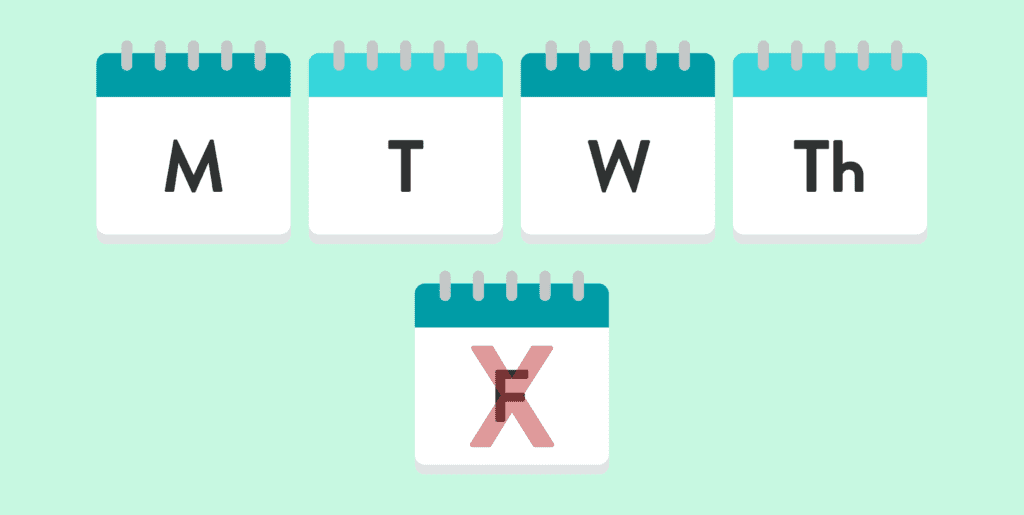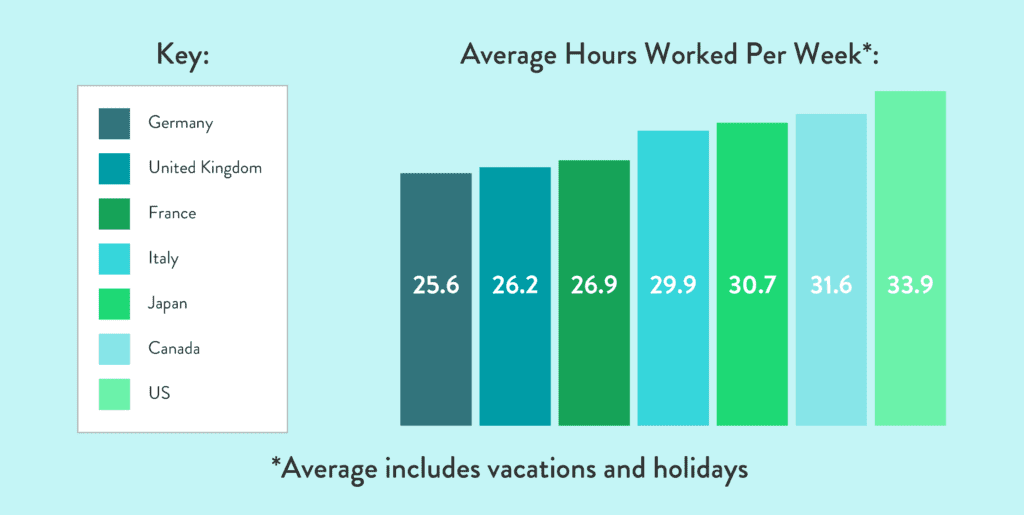Does a 4 Day Work Week Benefit Companies?

When it comes to the modern, 20th-century workplace, there are a lot of changes happening, as evidenced by the insights listed in our annual Salary Guide.
Remote work is on the rise, and more people are starting to question the traditional five-day week. So it’s no surprise that the idea of a 4-day workweek is becoming increasingly popular.
But does this actually mean shorter hours or less productivity?
Let’s take a look at what a four-day workweek could look like, why we’re here for it, and the moves we’re making as a company to get us there eventually.

Is the 4-day work week better?
It’s no secret that the traditional 9-5, five-day week isn’t ideal for everyone. In fact, recent studies have shown that working fewer hours per week can actually lead to more productivity. That’s why a four-day workweek is becoming an increasingly popular option for job seekers.
The benefits of a shorter workweek are not lost on U.S. government officials, and as recently as December of 2021, legislation to reduce the five-day workweek from 40 hours to 32 hours was introduced through the “32-Hour Workweek Act.”
Still, some are pushing back on a shorter week as concerns over lost productivity drive arguments to continue with the traditional 40-hour workweek. But is clinging to the traditional idea of a standard workweek founded?
Do Americans work more than other countries?
Compared to other countries with similar economic breakdown and workforce standards, the United States works the most average hours per week.
Despite the number of hours Americans work, there is still a lot of debate over whether or not shorter hours actually mean less productivity.
To further drive this point, here’s a breakdown of a study done by the Organization for Economic Co-operation and Development (OECD) between 2017 and 2020:
| Country | Average Hours Worked Per Week* |
| Germany | 25.6 |
| United Kingdom | 26.2 |
| France | 26.9 |
| Italy | 29.9 |
| Japan | 30.7 |
| Canada | 31.6 |
| United States | 33.9 |
| *Average includes vacations and holidays |

But here’s the kicker — while the average hours worked per week in the United States is highest on this list, Americans don’t rank AT ALL on the list of this comprehensive study measuring worker happiness by country.
And while we’re not data scientists, it’s not hard to connect the dots here, so we’ll let you draw your own conclusions.
ThredUp’s four-day workweek
In practice
The 300 salaried employees of the company now have a reduced workweek, allowing them to focus on essential tasks and fewer meetings.
This has occasionally resulted in spillover into Fridays, but overall, this change has been seen as positive for employee recharge and morale.
The new schedule enables employees to achieve a better balance between their professional and personal lives.
Benefits observed by ThreadUp
The introduction of wellness programs in the office has resulted in a much happier and healthier workforce. This has had the effect of reducing staff turnover, making it easier to maintain consistent operations.
Additionally, there has been a high interest from job applicants who are eager to work in an environment that values their well-being.
On top of that, productivity levels have either stayed the same or improved with this new emphasis on well-being within the office.
The growing trend
The trend of a four-day workweek is gaining momentum across industries, lauded for boosting productivity, employee morale, and satisfaction.
Key advocates like the United Auto Workers have successfully pushed for its adoption in the auto industry, while legislative efforts in states like California and Massachusetts aim to pilot it in public sectors.
Shorter workweeks are seen as a means to improve work-life balance, promote healthier lifestyles, and potentially create more jobs.
How does a 4-day work week benefit companies?
1. Increased flexibility and freedom
This is especially beneficial for parents who need to balance work with family obligations.
With a shorter work week, employees have more time to spend with their families and friends or pursue personal interests.
2. Reduced stress levels and improved mental health
It turns out that not being overwhelmed by a never-ending to-do list means feeling less stressed out and overworked.
This seemingly obvious yet often overlooked fact can significantly improve overall productivity.
3. Enhanced social connections
This aspect is particularly crucial in today’s digital era, where face-to-face interactions are gradually becoming elusive.
A four-day work week can offer employees the much-needed time to form and nurture in-person relationships.
These strengthened social bonds can contribute significantly to an individual’s happiness and overall well-being.
4. Less fatigue and burnout
Fewer working hours can lead to a significant reduction in employee burnout and exhaustion.
This is because a reduced workweek allows for better work-life balance, preventing overwork and the resulting fatigue that can detrimentally impact productivity and well-being.
5. Increased productivity
As we’ve previously discussed, there are numerous trials and studies supporting the idea that more hours worked do not necessarily equate to increased productivity.
These findings challenge the traditional 5-day work week model, suggesting that reducing work hours might actually lead to better performance and output.
6. Improved work-life balance
A better work-life balance is key to improving worker morale, contributing to a more positive and efficient workplace environment.
Additionally, it can lead to reduced worker turnover, as employees who experience a healthy balance between their work and personal lives are more likely to remain loyal to their employers.

Which countries have a 4-day work week?
It’s no secret that the United States is far behind when it comes to shorter workweeks, though some companies are starting to make the change. To help paint the picture let’s look at other countries that have adopted a shorter workweek.
Scotland launched a trial four-day workweek to reduce their hours by 20% without taking a hit to their pay. While the trial is ongoing, results have been promising.
Spain also announced that it would experiment with a four-day workweek over a 3-year trial period without cutting pay. The Spanish government is even going so far as to make up the difference in salary to cut down on employer risk.
Iceland, ranked #2 on the list of countries with the happiest workers, enjoys a four-day schedule and, as a result, there was a reduction in worker burnout.
4 day work week study
Shortening the workweek could be just what the doctor ordered to decrease stress and improve productivity in the workplace.
Iceland’s recent four-day workweek trials showed that a three-day weekend may be necessary for reducing employee stress levels and improving their overall mental health.
Is a 4-day work week beneficial?
A four-day workweek has a lot of benefits for employees and employers alike. From decreasing stress levels to improving productivity, there are plenty of reasons why both small and large businesses should consider transitioning away from a five-day week.
If you’re on the fence about giving it a try, do your own research and take a look at some of the studies that have been conducted on this topic.
The evidence is clear – a shorter workweek can lead to happier, healthier employees who are more productive overall.
Looking to hire top-tier Tech, Digital Marketing, or Creative Talent? We can help.
Every year, Mondo helps to fill over 2,000 open positions nationwide.
How Mondo is making moves toward a 4-day workweek
Leadership buy-in
Major systemic change is hard to come by without the support of the people up top which is why Mondo’s President, along with the backing of the executive team, is pushing for it to happen by empowering those in the company to innovate ways to get us there.
Implementation of Flex Fridays
Offering flexible schedules like this helps in getting everyone in the mindset of having a 4-day work week to ease the transition away from a strict two-day weekend.
Results-focused management style
Mondo focuses on the results a person gets in their workweek rather than the number of hours per week worked. Period.
Ongoing training enhancements
Our training shifts along with the evolving landscape and the needs of our team. We aim to give our people the tools, resources, and support they need to be efficient enough to hit their goals in fewer hours.
People-first company culture
Mondo places a strong emphasis on employee fulfillment, happiness, and mental health — and since studies show that a shorter week helps to promote all of these at once, we’d be silly not to work towards getting there ourselves.
Staying ahead of the curve
Mondo prides itself on being on the cutting edge of employment industry trends and injecting that into our strategies and relationships with our clients. Because we know that a 4-day work week has proven to be beneficial, we hope to be early adopters to this trend.

Is your business ready to make the change?
At Mondo, we believe in the power of a four-day work week. We’re not there yet, but we are working hard to get there by giving our employees autonomy to achieve their results and by implementing Flex Fridays as a means to get ahead of the week to come — and we want you to be part of it.
If you’re looking for an opportunity to join a team that is passionate about changing how work works, take a look at our current job openings. We can’t wait to hear from you!
Mondo Matches Great Talent With Great Companies
With an expansive, connected network of the top IT, Tech, Creative, and Digital Marketing professionals and a proprietary process, Mondo can match you with the hard-to-find, specialized talent you need.
- Contact Mondo today for all your hiring needs
- Download our 2022 Salary Guide for detailed salary breakdowns for roles & jobs across the technology, creative & digital marketing industries



